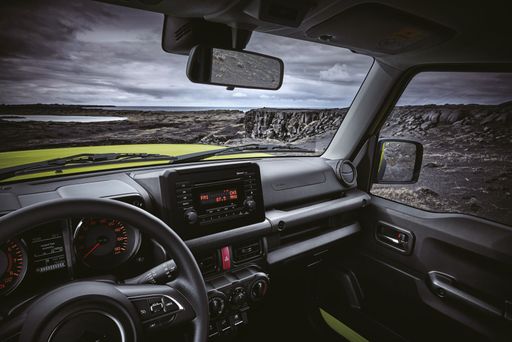Suzuki Jimny vs Toyota C-HR – Performance, range & efficiency compared
Two cars, one duel: Suzuki Jimny meets Toyota C-HR.
Which one wins in performance, efficiency and value for money? Find out now!
Costs and Efficiency:
When it comes to price and running costs, the biggest differences usually appear. This is often where you see which car fits your budget better in the long run.
Suzuki Jimny has a somewhat advantage in terms of price – it starts at 25300 £, while the Toyota C-HR costs 29100 £. That’s a price difference of around 3857 £.
Fuel consumption also shows a difference: Toyota C-HR manages with 0.80 L and is therefore decisively more efficient than the Suzuki Jimny with 7.70 L. The difference is about 6.90 L per 100 km.
Engine and Performance:
Under the bonnet, it becomes clear which model is tuned for sportiness and which one takes the lead when you hit the accelerator.
When it comes to engine power, the Toyota C-HR has a clearly edge – offering 223 HP compared to 102 HP. That’s roughly 121 HP more horsepower.
In acceleration from 0 to 100 km/h, the Toyota C-HR is convincingly quicker – completing the sprint in 7.40 s, while the Suzuki Jimny takes 12.80 s. That’s about 5.40 s faster.
In terms of top speed, the Toyota C-HR performs to a small extent better – reaching 180 km/h, while the Suzuki Jimny tops out at 145 km/h. The difference is around 35 km/h.
Space and Everyday Use:
Beyond pure performance, interior space and usability matter most in daily life. This is where you see which car is more practical and versatile.
Seats: Toyota C-HR offers clearly more seating capacity – 5 vs 2.
In curb weight, Suzuki Jimny is evident lighter – 1165 kg compared to 1505 kg. The difference is around 340 kg.
In maximum load capacity, the Toyota C-HR performs evident better – up to 1155 L, which is about 292 L more than the Suzuki Jimny.
When it comes to payload, Toyota C-HR clearly perceptible takes the win – 425 kg compared to 270 kg. That’s a difference of about 155 kg.
Who comes out on top?
Overall, the Toyota C-HR shows itself to be dominates this comparison and secures the title of DriveDuel Champion.
It convinces with the more balanced overall package and proves to be the more versatile choice for everyday use.
 @ Toyota Motor Corporation
@ Toyota Motor Corporation
Toyota C-HR
Suzuki Jimny
Brimming with raucous charm and unabashed off-road spirit, the Suzuki Jimny makes light work of rough tracks while remaining surprisingly at home in city streets. It's a cheeky, no-nonsense companion for buyers who prefer character over conformity — think go-anywhere attitude in a pocket-sized package.
details @ Suzuki Motor Corporation
@ Suzuki Motor Corporation
 @ Suzuki Motor Corporation
@ Suzuki Motor Corporation
 @ Suzuki Motor Corporation
@ Suzuki Motor Corporation
 @ Suzuki Motor Corporation
@ Suzuki Motor Corporation
Toyota C-HR
The Toyota C-HR cuts a striking figure with its angular styling and coupe-like profile, so you’ll never go unnoticed in the supermarket car park. It balances everyday practicality with a nimble, city-friendly personality, making routine commutes feel a touch more fun without asking for forgiveness.
details @ Toyota Motor Corporation
@ Toyota Motor Corporation
 @ Toyota Motor Corporation
@ Toyota Motor Corporation
 @ Toyota Motor Corporation
@ Toyota Motor Corporation
 @ Toyota Motor Corporation
@ Toyota Motor Corporation
 @ Toyota Motor Corporation
@ Toyota Motor Corporation
 @ Suzuki Motor Corporation
@ Suzuki Motor Corporation
|
 @ Toyota Motor Corporation
@ Toyota Motor Corporation
|
|
|
|
Costs and Consumption |
|
|---|---|
|
Price
25300 - 27700 £
|
Price
29100 - 42800 £
|
|
Consumption L/100km
7.70 L
|
Consumption L/100km
0.8 - 5.1 L
|
|
Consumption kWh/100km
-
|
Consumption kWh/100km
-
|
|
Electric Range
-
|
Electric Range
68 km
|
|
Battery Capacity
-
|
Battery Capacity
-
|
|
co2
173 g/km
|
co2
17 - 115 g/km
|
|
Fuel tank capacity
40 L
|
Fuel tank capacity
43 L
|
Dimensions and Body |
|
|---|---|
|
Body Type
Off-Roader
|
Body Type
SUV
|
|
Seats
2
|
Seats
5
|
|
Doors
3
|
Doors
5
|
|
Curb weight
1165 kg
|
Curb weight
1505 - 1755 kg
|
|
Trunk capacity
-
|
Trunk capacity
350 - 447 L
|
|
Length
3645 mm
|
Length
4362 mm
|
|
Width
1645 mm
|
Width
1832 mm
|
|
Height
1705 mm
|
Height
1558 - 1564 mm
|
|
Max trunk capacity
863 L
|
Max trunk capacity
1076 - 1155 L
|
|
Payload
270 kg
|
Payload
375 - 425 kg
|
Engine and Performance |
|
|---|---|
|
Engine Type
Petrol
|
Engine Type
Full Hybrid, Plugin Hybrid
|
|
Transmission
Manuel
|
Transmission
Automatic
|
|
Transmission Detail
Manual Gearbox
|
Transmission Detail
CVT
|
|
Drive Type
All-Wheel Drive
|
Drive Type
Front-Wheel Drive, All-Wheel Drive
|
|
Power HP
102 HP
|
Power HP
140 - 223 HP
|
|
Acceleration 0-100km/h
12.80 s
|
Acceleration 0-100km/h
7.4 - 9.9 s
|
|
Max Speed
145 km/h
|
Max Speed
175 - 180 km/h
|
|
Torque
130 Nm
|
Torque
-
|
|
Number of Cylinders
4
|
Number of Cylinders
4
|
|
Power kW
75 kW
|
Power kW
103 - 164 kW
|
|
Engine capacity
1462 cm3
|
Engine capacity
1798 - 1987 cm3
|
General |
|
|---|---|
|
Model Year
2021 - 2024
|
Model Year
2024 - 2025
|
|
CO2 Efficiency Class
F
|
CO2 Efficiency Class
C, B
|
|
Brand
Suzuki
|
Brand
Toyota
|
What drivetrain options does the Suzuki Jimny have?
The Suzuki Jimny is offered with All-Wheel Drive.
The prices and data displayed are estimates based on German list prices and may vary by country. This information is not legally binding.
